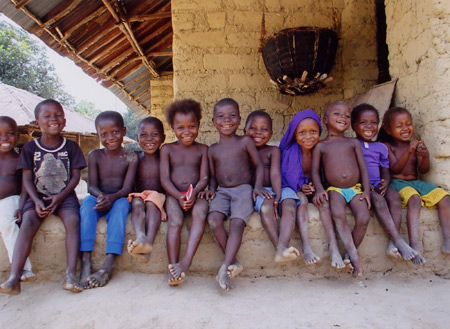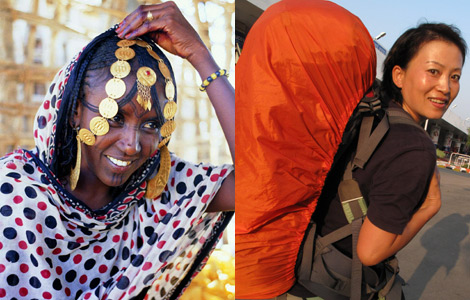Life
Lifting the veil
Updated: 2011-03-31 07:55
By Chen Nan (China Daily)
With just 10,000 yuan ($1,521) in her pocket, Liang Zi hopped on a flight in July 2000 to a small landlocked country in southern Africa, to realize a long-held dream.
|
 Laughing kids are Liang Zi's favorite photographic subject when she visits African countries. Photos Provided by Lang Zi to China Daily |
Liang stayed in the small villages of Lesotho for four months, taking more than 1,000 pictures that capture a way of life that harks back to the past.
That trip led to a continuing exploration of the Sub-Saharan Africa region, including Sierra Leone in the west, Eritrea in the east and Cameroon in the middle, making her the first Chinese woman photographer to reveal rarely seen facets of Africa.
Liang spoke about her eight Africa trips at Beijing's Ullens Center for Contemporary Art (UCCA) recently. Through her photographs, videos and books, she shared the beautiful scenery of remote parts of Africa, often untouched by civilization.
"My interest in Africa was triggered by San Mao (late Taiwan writer)," says Liang, 40. "Her descriptions of her travels and pursuit of freedom left a deep impression on me."
Before leaving for Lesotho, her impressions of Africa were the usual stereotypes - rustic, hot, and culturally rich. Once she made up her mind to visit, she sought out every piece of information she could.
Finally, after about a year, she met a friend from Taiwan who knew a tribal chief in Lesotho. That's when she quit her media job and flew out.
"I was concerned about safety issues, such as HIV/AIDS problem, robbery and rape," she says.
But her eagerness to visit overrode her fears and she landed in Lesotho to find a very different place from what she had imagined.
|
 Being a woman photographer made it easier for Liang Zi (right) to get close to women in Africa. |
"I lived in a small village of about 2,000 people and got to know almost everyone in about a month," she says.
The villagers were wary of her in the beginning, she says, as it was the first time they had seen a Chinese person and they didn't understand why she was there.
"When I arrived, I first visited the local leaders and told them who I was and what I had come for. I was always respectful and wore a big smile," she says.
She would take her pictures in the mornings and spend the rest of the day eating and chatting with the locals.
"My English was not good and a translator was not always available. But we always managed to make ourselves understood which was very interesting," she says.
Although the living conditions left much to be desired, Liang says she found the simple life relaxing, and the fact that the locals would break into a spontaneous song or dance every so often, very endearing.
"This is why I like traveling to small villages rather than the big cities," Liang says.
Although impressed by the natural beauty of these places, Liang trained her lens on the people, especially women and children.
"I wanted each of my pictures to tell a story. By observing the people and communicating with them I was able to capture the wonderful stories behind the photographs," she recalls.
She would set out with her camera every day, with no clear plan of what she wanted to photograph. "In those small villages in Africa, everything is so charming and fresh. Even a bad picture looks good because you can interpret it the way you want."
Being a woman photographer made it easier for her to get close to the local women.
She recalls the time she was in a small Muslim village near the Red Sea. The women are not allowed to be photographed. But since Liang had lived in the village and established a rapport with them for a month-and-a-half, she was able to take their pictures.
She says the two biggest challenges she faced in Africa were the long hours she spent traveling and the lack of entertainment.
Born into a military family, she joined the army at the age of 16.
"I'm not afraid of anything," says Liang, who served in the army for nearly 15 years. "Its rigid training made me disciplined and determined, qualities that came in very handy on my trips to Africa," she adds.
She has already written three books about Africa and her video footage has been shown on TV. She says the places she visited are changing, and she has a strong desire to visit again before its secrets are lost forever.
Liang is not keen to hold an exhibition her Africa photographs as she feels she needs words to go with the photos.
"I've seen people at a photo exhibition. They take a quick look and may even express amazement over some images, but that's all.
"I want my viewers to know the stories behind each photo," she says.
Specials

Tea-ing up
More turning to Chinese tea for investment opportunities like vintage wine

A cut above
The ancient city of Luoyang is home to a treasure trove of cultural wonders.

Rise and shine
The Chinese solar energy industry is heating up following recent setbacks in the nuclear sector